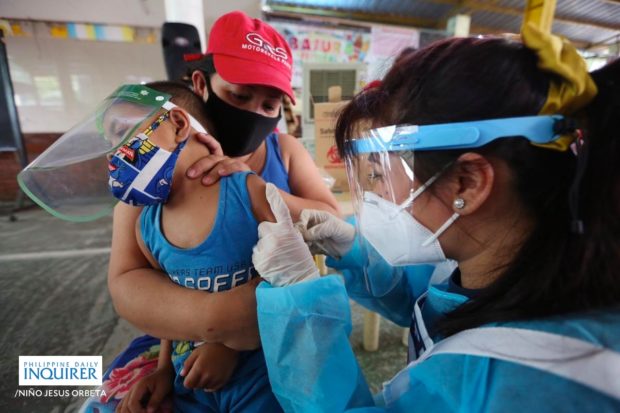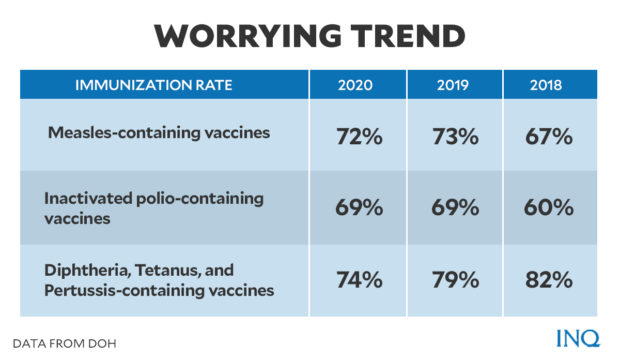COVID’s other harm: War on polio, measles slows

Children get free vaccine against measles-rubella and polio in Quezon City. FILE PHOTO/NIÑO JESUS ORBETA
MANILA, Philippines—While all eyes are fixed on the COVID-19 pandemic, barely any attention is being given to what could be an equally devastating health crisis—the decline in child immunization against killer but preventable diseases.
The United Nations International Children’s Emergency Fund (Unicef) in 2019 said because of the “alarming” drop in inoculation rates against “deadly, but preventable diseases,” some 2.9 million children in the Philippines had been put at risk.
In recent years, child immunization coverage has been “sharply declining” from 87 percent in 2014 to 68 percent in 2019, exposing children to diseases like measles, polio, DTP (diphtheria, tetanus and pertussis).
The rate is way below the 95 percent recommended by World Health Organization (WHO) to protect children from measles—“often the first disease to resurge when children are not reached with vaccines—and insufficient to stop other vaccine-preventable diseases.”
Last July 15, Unicef Executive Director Henrietta Fore stressed, “Even before the pandemic, there were worrying signs that we were beginning to lose ground in the fight to immunize children against preventable child illness.”
“The pandemic has made a bad situation worse,” said Fore.
“With the equitable distribution of COVID-19 vaccines at the forefront of everyone’s minds, we must remember that vaccine distribution has always been inequitable, but it does not have to be,” she added.
In 2020, as lockdowns disrupted routine inoculation in several communities in the Philippines, Unicef emphasized that life-saving health intervention, like immunization, should not be neglected in the midst of efforts to contain COVID-19.
In 2021, data from WHO said that immunization coverage rates for measles-containing vaccines (MCV-1), inactivated polio-containing vaccines, and diphtheria, tetanus and pertussis-containing vaccines (DTP-1) declined.
From 67 percent in 2018 and 73 percent in 2019, MCV-1 injection rate was 72 percent in 2020. MCV-1 prevents measles, a highly contagious disease that attacks the respiratory tract and is fatal to children below five years of age.
For DTP-1, the vaccine which prevents DTP, the rate declined from 82 percent in 2018 to 79 percent in 2019 and 74 percent in 2020. DTP is a group of three serious diseases—diphtheria can lead to difficulty breathing, heart failure, paralysis, or death.
Pertussis can cause uncontrollable, violent coughing which makes it hard to breathe, eat, or drink and is extremely dangerous in babies and young children while tetanus leads to serious health problems, including death.
The rate for inactivated polio-containing vaccines increased from 60 percent in 2018 to 69 percent in 2019. However, the rate was stagnant in 2020.
Rise in child illnesses
A global report from WHO and Unicef revealed that in 2020, because of the COVID-19 contagion, 23 million children missed out on basic vaccines, 3.7 million more than those who missed vaccines in 2019.
They said that as immunization coverage slides down, many countries risk the “resurgence of measles, other vaccine-preventable diseases.”
Filipino physician Albert Domingo said the COVID-19 crisis and its restrictions are considered to be “one major reason for the decline in childhood immunization.”
In 2019, the Department of Health (DOH) declared a measles outbreak in several regions. This followed the 67 percent MCV-1 injection rate in 2018.
A January 2019 report said Metro Manila had 441 measles cases and 5 deaths; Central Luzon had 192 cases and 4 deaths; Calabarzon had 575 cases and 9 deaths; Western Visayas had 104 cases and 3 deaths; and Central Visayas had 71 cases and 1 death.
Following the 60 percent rate in injections of polio vaccines in 2018, the DOH declared in 2019 an outbreak of polio, a crippling disease.
WHO and Unicef said that “disruptions in immunization services were widespread in 2020” and mostly affected the Eastern Mediterranean region and Southeast Asian nations, including the Philippines which had 797,000 children who did not receive their first dose of DTP-1. It was 472,000 higher than the 2019 data.
COVID-19 and child diseases
In the midst of the COVID-19 catastrophe, because of a higher rate of immunization coverage in previous years, there was a decline in cases of child illnesses.
There were 3,832 cases of measles in 2020 – lower than the 48,525 in 2019. Polio cases also went down from 14 in 2019 to 1 in 2020. There were 75 cases of diphtheria in 2020—lower than 201 in 2019.
In 2019, there were 78 cases of neonatal tetanus, but it went down to 28 in 2020. Cases of pertussis also decreased from 114 in 2019 to 35 in 2020.
But health experts said that the low immunization rate in 2020 could translate to higher cases of vaccine-preventable diseases in 2021.
Domingo, a health systems expert, explained that “a low immunization rate in any year for a particular vaccine-preventable disease increases the risk for an outbreak of that disease.”
In 2020, Dr. Wilda Silva, of the National Immunization Program of the Philippines, said that the government will have a nationwide immunization campaign to control the polio outbreak and to prevent a 2021 measles outbreak, saying that 2.4 million Filipino children are at risk.
Dr. Joshua San Pedro said to prevent the “worst” in child diseases, the government should “learn from grave mistakes by being proactive when it comes to health care.”
“We already saw the deaths in vulnerable communities wrought by measles, the sudden infamy of the Philippines when polio returned,” said San Pedro.
“The right to health must be realized in a community-based health system that serves the marginalized, not just those who can afford,” he said.
Noting the global decline in immunization coverage, Dr. Seth Berkley, CEO of Gavi, the Vaccine Alliance, said, “This is a wake-up call – we cannot allow a legacy of COVID-19 to be the resurgence of measles, polio and other killers.”
“We all need to work together to help countries both defeat COVID-19, by ensuring global, equitable access to vaccines, and get routine immunization programmes back on track,” she said.
TSB
For more news about the novel coronavirus click here.
What you need to know about Coronavirus.
For more information on COVID-19, call the DOH Hotline: (02) 86517800 local 1149/1150.
The Inquirer Foundation supports our healthcare frontliners and is still accepting cash donations to be deposited at Banco de Oro (BDO) current account #007960018860 or donate through PayMaya using this link.


